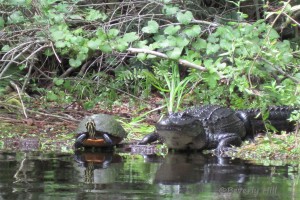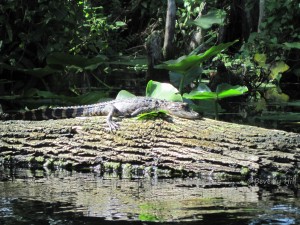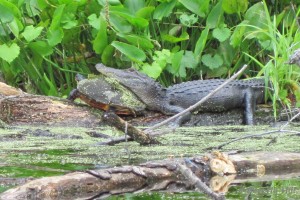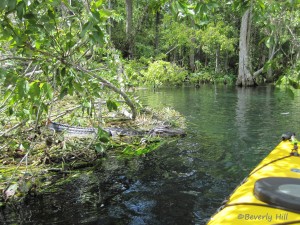One of the great things about canoeing or kayaking is it enables paddlers better access to remote places where they can see nature up close and personal. This sometimes comes with an added element of danger, for instance, paddling in the rivers, canals and marshes of Florida, Louisiana, Mississippi, Alabama, Georgia, southeast Texas and the Carolinas often puts kayakers and canoeists in close proximity to a prehistoric reptile, the American alligator, or Alligator mississippiensis.
Alligator Facts
Alligators have remained virtually unchanged for thousands of years and they are perfectly suited for their role of ambush predator. They can remain submerged for hours, surfacing only periodically for air, and even then only the tip of the snout need break the surface. These stealthy hunters lie in wait for prey to come close enough to grab whereupon they drown them with an impressive rolling maneuver before dragging them beneath the water to feed on.
Despite their stealth and cunning, alligators are not a creature to be feared; instead they should be treated with respect. Attacks on kayaks and canoes are rare, but paddlers should remain watchful and cautious around these animals and when one is spotted it should be given it a respectful distance. An alligator with a hissing, open mouth is issuing a clear warning to back off. Never approach an alligator nest or baby alligators because the mother will aggressively defend her young.
Alligators come in intimidating sizes, commonly reaching lengths of 9′ for females to 13′ for males. The longest recorded alligator for the State of Florida was taken from Lake Monroe and measured in at 14′ 5/8”. The heaviest Florida alligator weighed in at 1,043 lbs taken from Lake Dora. But it doesn’t take a large alligator to put a hurt on someone; smaller ones than these have attacked and dispatched humans.
Things to Remember When Paddling Near Alligators
When paddling it’s important to remember that, like sharks, alligators are most active at dusk and dawn. During the day they like to hang out near shore amid thick plant growth and can often be spotted basking onshore just around bends in creeks and rivers. Paddlers should avoid paddling too close to the shore, especially when negotiating turns. Never block an alligator’s escape route to the water.
If an alligator should approach or happen to surface near a kayak or canoe, get some distance quickly. Some paddlers have found it effective to beat their paddle against their kayak to create a loud noise. Since this isn’t a scientifically tested method, distance is the safest recourse. If these methods fail and the vessel is attacked, try to remain calm and use the paddle for defense. Strike hard and get away fast.
Best Places to See Alligators
Alligators can be found in almost any fresh body of water across the southern United States including places like the Okefenokee Swamp and Everglades National Park. The author recently went on a kayaking trip to Silver River and Alexander Creek in Florida and can also recommend these as excellent locations for seeing nature and alligators up close.
This article is copyrighted by Beverly Hill




